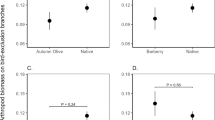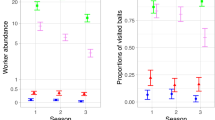Abstract
In this paper we test the influence of temperature and interference competition by dominant species on the foraging of subordinate species in Mediterranean ant communities. We have analyzed the changes in resource use by subordinate species in plots with different abundances of dominant ants, and in different periods of the day and the year, i.e., at different temperatures. The expected effects of competition by dominant species on foraging of subordinates were only detected for two species in the number of baits occupied per day, and for one species in the number of foragers at pitfall traps. In all three cases, subordinate species were less represented at baits or in traps in plots with a high density of dominants than in plots with a medium or low density of dominants. The number of workers per bait, and the foraging efficiency of subordinate species did not differ in plots differing in dominant abundance. Daily activity rhythms and curves of temperature versus foraging activity of subordinate species were also similar in plots with different abundance of dominant species, indicating no effect of dominants on the foraging times of subordinates. Instead, temperature had a considerable effect on the foraging of subordinate species. A significant relationship was found between maximum daily temperature and several variables related to foraging (the number of foragers at pitfall traps, the number of baits occupied per day, and the number of workers per bait) of a number subordinate species, both in summer and autumn. These results suggest that the foraging of subordinate ant species in open Mediterranean habitats is influenced more by temperature than by competition of dominants, although an effect of dominants on subordinates has been shown in a few cases. In ant communities living in these severe and variable environments, thermal tolerance reduces the importance of competition, and the mutual exclusion usually found between dominant and subordinate species appears to be the result of physiological specialization to different temperature ranges.
Similar content being viewed by others
Author information
Authors and Affiliations
Additional information
Received: 8 May 1998 / Accepted: 30 July 1998
Rights and permissions
About this article
Cite this article
Cerdá, X., Retana, J. & Manzaneda, A. The role of competition by dominants and temperature in the foraging of subordinate species in Mediterranean ant communities. Oecologia 117, 404–412 (1998). https://doi.org/10.1007/s004420050674
Issue Date:
DOI: https://doi.org/10.1007/s004420050674




